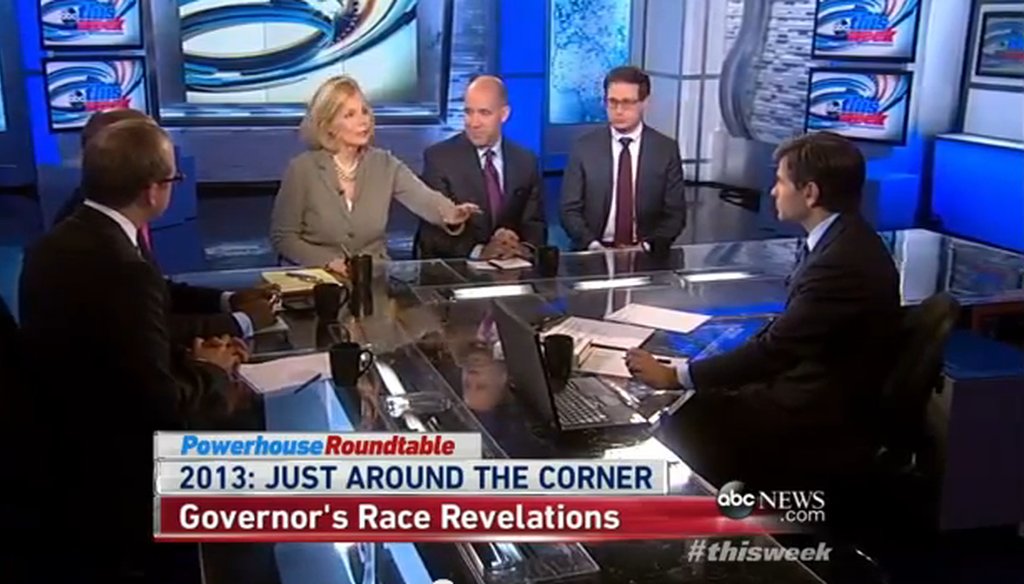Get PolitiFact in your inbox.

ABC's "Powerhouse Roundtable" talked about the health care law and politics heading into the 2014 elections.
Nearly two-dozen pundits blitzed five Sunday news shows to dissect and criticize the troubled rollout of President Barack Obama’s health care law, highlighting pitiful enrollment statistics and discussing whether you really can keep the health care plan you like.
Karl Rove on Fox News Sunday, Peggy Noonan on This Week and Bill Kristol on Meet the Press took turns attacking the health care law, while former White House advisers Ezekiel Emanuel, Van Jones and David Axelrod did their best to defend it.
But were their assertions correct?
PunditFact, a new fact-checking project of the Tampa Bay Times, launches today aiming to sort out the truth for you.
Like PolitiFact, PunditFact will rate statements based on the Truth-O-Meter. What’s different is PunditFact will solely focus on pundits and members of the media on radio, television and in newspapers and online.
We define a pundit as someone who offers analysis or opinions on the news, particularly politics and public policy. One can engage in punditry by writing, blogging or appearing on radio or TV. A pundit is not an elected official, not a declared candidate nor anyone in an official capacity with a political party, campaign or government.
As for the Sunday news shows, some pundits performed better than others.
The liveliest debate came on Fox News Sunday between Emanuel, a former health care adviser to President Barack Obama, and James Capretta, a conservative health policy expert.
The two jostled for 15 minutes, talking over each other and host Chris Wallace. The debate got so heated that Wallace quipped, "Maybe I’ll stop calling you gentlemen."
In the middle of it all, Emanuel doubled down on an assertion that the White House isn’t to blame for the millions of people who will or could see their health insurance policies canceled.
"The insurance companies are making that choice, not the president," he said. "The law does not require that."
The fact is, Emanuel’s explanation hinges on a technicality. It is up to insurers how they comply with the law, which mandates that policyholders be covered for 10 "essential health benefits," except for plans that are grandfathered in. But there’s little doubt the new law is influencing their changes in coverage. In fact, the law specifically was designed to eventually do away with insurance that doesn't meet minimum coverage standards.
PunditFact rates Ezekiel’s claim Mostly False.
Later on the show, senator-turned-commentator Scott Brown, a Republican from Massachusetts, repeated a basic and oft-repeated criticism of the health care law — that it raises taxes and cuts Medicare.
On the taxes question, he is correct: The law includes new taxes on households making more than $250,000 a year, a tax on manufacturers and importers of certain medical devices, and a 10 percent tax on indoor tanning services, among other things.
But Brown went too far in saying the law cuts Medicare. Rather, the law shrinks the rate at which Medicare was expected to expand in the future. On balance, we rate Brown’s claim Mostly True.
Talk about the health care law dominated all of the shows. On CBS’ Face the Nation, CBS legal correspondent Jan Crawford unleashed a startling — and largely correct — statistic: that only six people were able to sign up for health care through the federal insurance marketplace on the day healthcare.gov launched Oct. 1.
The figure comes from documents released by the House committee investigating the failed website rollout and traces back to handwritten notes at the Centers for Medicare and Medicaid Services, the agency in charge of the website project. A note from the morning of Oct. 2 said that just "six enrollments have occurred."
By the end of the second day, the notes reported 248 people had signed up and about 40,000 applications were pending.
A spokesperson for the U.S. Health and Human Services Department told reporters that these were not official numbers and that people could also enroll through other means, including filling out paper applications. Some states are also operating their own insurance marketplaces.
That caveat was enough to rate Crawford’s claim Mostly True.
Over on ABC’s This Week, Jones — a former Obama adviser who now is a CNN Crossfire host -- suggested much of the talk about people losing their insurance coverage is a red herring. Referencing the individual insurance market, which is how about 6 percent of Americans purchase their coverage, Jones said things always have been volatile and that insurance companies have a habit of canceling policies.
Before Obamacare became law, Jones said that "only 14 percent of Americans were able to keep these individual market plans for two years."
The number he meant to say was 17 percent — it comes from a 2004 study published in the journal Health Affairs. The key finding: "Roughly one-sixth (17 percent) of those with individual insurance coverage retained it for more than two years."
But the number does not exactly mean what Jones said it does, Washington and Lee law professor Timothy Jost told PunditFact. Jones is saying it’s the fault of insurance companies that most people could not hold onto their coverage, but the reality is less known.
In fact, the 2004 study suggested the biggest culprit had to do with policyholders moving between employer coverage -- meaning they got a job or switched jobs. So we rate Jones’ claim Half True.
Lastly, on This Week’s "Powerhouse Roundtable," panelists debated the politics of what all this means ahead of the 2014 midterm elections.
ABC’s Jonathan Karl, fivethirtyeight.com blogger Nate Silver and host George Stephanopoulos discussed a poll that asked registered voters who they would choose for Congress next year -- a Democrat, or a Republican. By a 48-40 margin, voters said they would vote for a Democrat.
Karl said not to read too much into the number, pointing to similar polls ahead of Republicans landslides in 1994 and 2010.
"Before the Republican wave in 2010, Democrats had an advantage on the generic ballot in Congress," Karl said. "Even in 1994 with the Gingrich revolution ... Democrats had that advantage."
Turns out, he’s right. Part of the reason, experts told us, is that a lot of Democratic voters are packed into urban districts, so the playing field isn’t spread evenly.
PunditFact and PolitiFact staff writers Steve Contorno, Jon Greenberg, Louis Jacobson, Julie Kliegman, Katie Sanders and Amy Sherman contributed to this story. Aaron Sharockman is the editor of PunditFact and can be reached at [email protected].
Our Sources
See individual fact-checks.






























